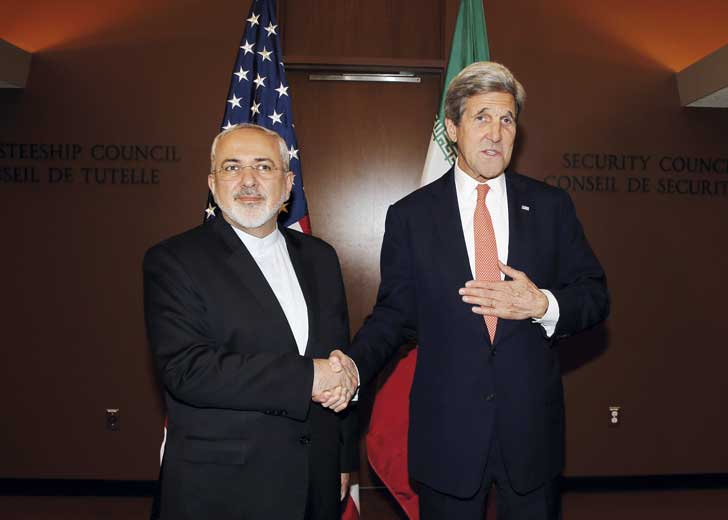

Key events and trends over the past 12 months and their impact on the outlook for the Middle East and North Africa region
The year 2016 will be remembered as when the full impact emerged of the mid-2014 oil price crash on the regions economies.
The past 12 months were characterised by spending cuts and deficits, job losses and payment arrears, as well as frequent downgrades to sovereign ratings and global and regional growth forecasts.
The year also saw long-awaited subsidy reforms, the introduction of taxes and a record level of bond issuance. Politically, 2016 was equally momentous, beginning with the lifting of nuclear-related sanctions on Iran and ending with a new US president set to take office in the White House. In between, there were significant government restructurings in the GCC, while wars continued to rage in Libya, Iraq, Syria and Yemen.
January
? Brent crude hits a 13-year low of $27.67 a barrel on 18 January before recovering to just over $32.
? Saudi Arabia announces a budget of $224bn for 2016, a reduction of about 14 per cent on actual spend in 2015. Riyadh expects a $87bn budget deficit, with revenues down 16 per cent.
? Six months after the signing of the Joint Comprehensive Plan of Action, sanctions against Iran are lifted on 16 January.
February
? US ratings agency Standard & Poors lowers its ratings for Saudi Arabia, Oman and Bahrain as a result of sustained low oil prices.
? The UAE says it is considering ending subsidies on electricity and gas sold to power generation companies, as the second-largest GCC economy implements a wider strategy to reduce the burden on the government budget.
March
? Cairo announces a 14.5 per cent devaluation of the Egyptian pound. This is followed in November by the full flotation of the Egyptian currency, which sees it lose about 50 per cent of its value.
? Kuwaits cabinet approves the introduction of a 10 per cent tax on corporate profits as part of wider economic reforms.
? Iran increases oil production by 187,800 barrels a day in the first month after sanctions were lifted against its energy sector.
April
? Saudi Arabias cabinet on 25 April approves Vision 2030, which sets out Riyadhs plans for sweeping economic reforms and its strategy for the next 15 years.
? The UAE will register its first current account deficit in 37 years in 2016, according to the Washington-based IMF. The fund indicates the countrys current account balance will have a shortfall of $3.17bn in 2016, equivalent to nearly 1 per cent of nominal GDP.
? Saudi Arabia has identified 146 state entities that could be privatised or sold to the public as it looks to monetise assets to meet budget shortfalls. On the list is oil giant Saudi Aramco.
May
? Saudi Aramco chairman Khalid al-Falih is named as Saudi Arabias new energy, industry & mineral resources minister on 7 May as part of a wide-ranging government shake-up. He replaces Ali al-Naimi, who served as oil minister for more than 20 years.
July
? Qatars Development Planning & Statistics Ministry revises its forecast for the states fiscal deficit for 2016 from 4.8 per cent to 7.8 per cent of GDP. It also downgrades its 2016 economic growth forecast from 4.3 per cent to 3.9 per cent.
August
? Kuwait is planning to sell 20-30 per cent stakes in up to four oil and petrochemicals subsidiaries of Kuwait Petroleum Corporation.
? Dubai ruler Sheikh Mohammed bin Rashid al-Maktoum issues a decree forcing several public officials into early retirement.
? Kuwaits cabinet approves a series of fuel-related subsidy reforms, including an 83 per cent increase in ultra-premium petrol prices and a 42 per cent increase in octane-91 petrol prices.
September
? The IMF reaches an agreement with Egypt for a $12bn, three-year funding facility to support government reforms.
? Irans Vice-President Eshaq Jahangiri issues an executive order for the Ministry of Petroleum to start using the new Iran Petroleum Contract model, ratified by the cabinet earlier in September.

The emir of Kuwait dissolved parliament in October
The emir of Kuwait dissolved parliament in October
October
? The emir of Kuwait dissolves the countrys parliament, citing mounting security challenges and volatile regional developments that require a new government.
November
? Saudi Arabia concludes the largest-ever emerging market bond sale, raising $17.5bn in its debut international debt offering as it seeks to plug its budget deficit.
? Iraqi government forces start their campaign to retake Mosul from the jihadist group Islamic State in Iraq & Syria.
? Opposition candidates win almost half of the 50 seats in Kuwaits parliamentary election, marking an end to their four-year boycott of the political process.
December
? Oman Oil Company and Petroleum Development Oman are planning higher levels of private sector investment in oil and petrochemicals subsidiaries.
? Non-Opec oil producers agree with Opec to cut output by about 600,000 barrels a day (b/d) from January. The news follows the 30 November agreement by Opec members to cut production by 1.2 million b/d.
? Irans President Hassan Rouhani has submitted a budget of $338bn for the fiscal year ending 20 March 2018 that assumes a 50 per cent increase in crude revenues, and allows for a 9 per cent increase in capital expenditure.
? Syrias government forces have re-established control of the last rebel-held areas in the city of Aleppo.
You might also like...

Rainmaking in the world economy
19 April 2024

Oman receives Madha industrial city tender prices
19 April 2024

Neom seeks to raise funds in $1.3bn sukuk sale
19 April 2024

Saudi firm advances Neutral Zone real estate plans
19 April 2024
A MEED Subscription...
Subscribe or upgrade your current MEED.com package to support your strategic planning with the MENA region’s best source of business information. Proceed to our online shop below to find out more about the features in each package.





